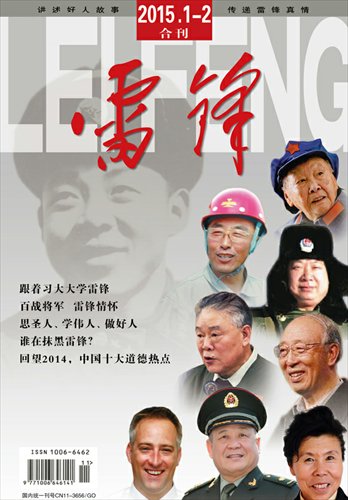
The cover of the Lei Feng magazine (Photo/Xinhuanet.com)
A new magazine named after Lei Feng, a good samaritan widely popular in the 1960s, was launched officially in Beijing on July 24.
Lei Feng, a soldier of the People's Liberation Army born in 1940 and died at the age of 21, has been highly praised by the Party leaders for his selfless acts and has been portrayed as a role model after his death. The country even launched an annual nationwide "Learn From Comrade Lei Feng" campaign to encourage people to do good deeds since 1960s.
With the passage of time, Lei's spirit has faded in the society increasingly driven by materialist gains. A group of cultural experts and Lei's supporters therefore decided to launch a monthly magazine that instills positive energy into the society and enhance moral values.
However, some people have also doubted the usefulness of such a venture given that other similar media products named after Lei already exist in China.
Noble intentions
"Our country advocates the philosophy of Confucius and Mencius, but surprisingly, questions such as whether it is wise to help an elderly person who falls down on the ground have become a subject of debate in recent years. Following a decline in moral values in the society, it is necessary to have a magazine that advocates Lei," Tao Ke, editor-in-chief of Lei Feng magazine, told news portal thepaper.cn.
Song Shaofu, the office director of Lei Feng magazine, told the Global Times that the first volume of the magazine, priced at 8.3 yuan ($1.3), is now in the market and can be subscribed at post offices nationwide.
The 80-page magazine features Chinese officials' discourses on the spirit of Lei, stories of modern-day good samaritans and people who admire Lei. It shares the practices of organizations and individuals which conform to the spirit of Lei, and discuss social hot topics.
The inaugural edition features a story of a 103-year-old Red Army soldier who is a fan of Lei. The magazine's team interviewed the female soldier for two days to report her admiration of Lei.
"Since the spirit of Lei is closely related to social development, the magazine, with reference to social topics, demonstrates what is right and wrong and what is good and bad," Song said.
The magazine will soon launch its own website while its WeChat account called "Haorenleifeng" is already active.
The office has published 50,000 copies of the first edition and so far they have received around 20,000 subscriptions, which Song described as "an encouraging figure for a new magazine."
In fact, the team, which is made up of dozens of cultural experts and enthusiasts of Lei, aims to distribute the monthly magazine nationwide, and raise the price to 10 yuan starting from next year.
"When we were considering the price, we thought it was important that the magazine was affordable to ordinary citizens. However, it cannot be free of charge. For each copy we sell, we will donate 1 yuan to the Lei Feng Foundation the magazine launched which aims to build schools and hold courses in the name of Lei in poverty-stricken areas in China," Song explained, revealing that a Lei Feng primary school has been set up in Chiping county, East China's Shandong Province, which runs extra classes on Lei Feng and his spirit.
"The Lei Feng magazine is not simply a magazine, but a tool that supports public welfare," he said.
Defying critics
Responding to speculation that the magazine is government-funded, Song said it is funded by organization donations, the team's own money and also from readers' subscriptions while its advertisement policy states that only advertisements for products of good quality could be placed.
Despite some netizens showing support to the magazine, saying it is good to have a media that seeks to spread positive messages, many have doubts over the actual impact it can have on the society.
"The theme of the magazine is outdated. We do not need samaritans but better law enforcement," a netizen surnamed Zhang from North China's Shanxi Province argued, "People are reluctant to help an old woman who has fallen not because they are not kind-hearted, but because they might have been cheated for money before or have been warned about that."
"If Lei was still alive, he would be cheated for money too," another netizen from Central China's Henan Province echoed.
Some even doubted if the character really existed.
"Some doubted if the materials are genuine. There are books that have investigated the background of Lei and some of Lei's friends in the army are still alive. In the magazine, we will provide rebuttal of every remark that damages Lei's reputation," Song said.
Before the launch of the Lei Feng magazine, some media products named after Lei such as leiphone.com, an information technology and service platform and a regional TV channel, Lei Feng Channel in Fushun, Northeast China's Liaoning Province, are already in operation.
However, the website only used Lei as a gimmick while the TV channel is facing difficulties in remaining in operation after just half a year because stories about good news and good deeds have strong similarities and struggle to gain traction.
Wang Sixin, a media law professor with Communications University of China, told the Global Times that it is understandable why many citizens admire Lei Feng, which could be the reason why his name is used for so many products and marketing programs, but it is vital to remember that not every individual will accept the message and correct their behavior, as the times have changed," he said.
Song said he is not worried that the magazine might meet the similar fate as the TV channel because the magazine's content is more diverse, adding that they have received support from people in other provinces.
Wang said that since the magazine is market-driven, the market will ultimately decide whether there is a demand for such a product.


















































